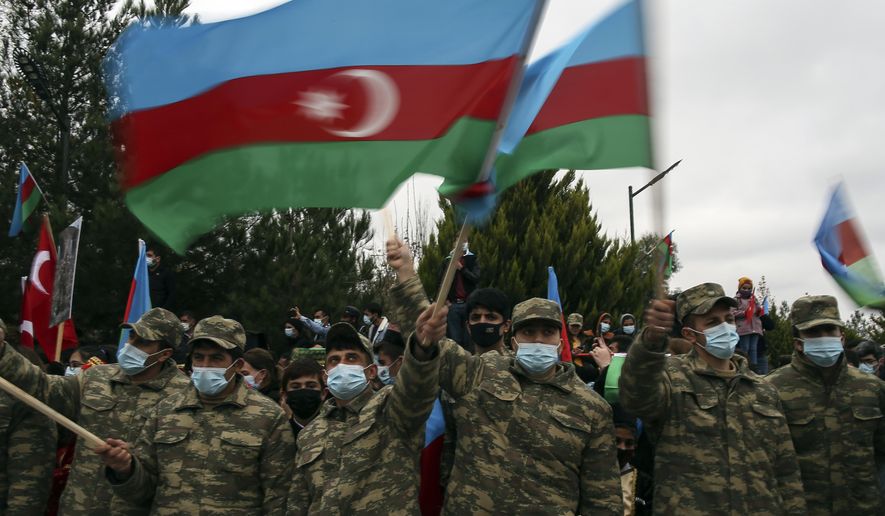BAKU, Azerbaijan (AP) - Azerbaijan on Tuesday completed reclaiming territory held by Armenian forces for more than a quarter-century after a peace deal ended six weeks of fierce fighting over Nagorno-Karabakh.
Azerbaijani President Ilham Aliyev hailed the restoration of control over the areas as a “historic victory” and a demonstration of his nation’s “unbending spirit.”
“We all lived with one dream, and now we fulfilled it,” Aliyev said in an address to the nation. “We won a victory on the battlefield and in the political arena, and that victory opens a new era for our country. It will be an era of development, security and progress.”
Nagorno-Karabakh lies within Azerbaijan but has been under the control of ethnic Armenian forces backed by Armenia since a separatist war there ended in 1994. That conflict left not only Nagorno-Karabakh itself but large chunks of surrounding lands in Armenian hands.
In 44 days of heavy fighting that began on Sept. 27, the Azerbaijani military routed Armenian forces and moved deep into Nagorno-Karabakh, forcing Armenia to accept a Russia-brokered peace deal that took effect Nov. 10. The agreement saw the return to Azerbaijan of a significant part of Nagorno-Karabakh and also required Armenia to hand over all of the regions it held outside the separatist region.
The Lachin region, which lies between Nagorno-Karabakh and Armenia, was the last of the three areas on the rim of Nagorno-Karabakh to be surrendered by Armenian forces on Tuesday.
Russia deployed nearly 2,000 peacekeepers for at least five years to monitor the peace deal and help the return of refugees. The Russian troops will also ensure safe transit between Nagorno-Karabakh and Armenia across the Lachin region.
“We have restored historic truth,” Aliyev said. “The Azerbaijani people will do everything to rebuild the ruined cities and villages. From now on, we will live as a great and proud people.”
He said 94 Azerbaijani civilians were killed and more than 400 were wounded in the latest fighting, but he again refrained from revealing his country’s military losses.
Armenia’s Health Minister said last month that at least 2,425 Armenian servicemen were killed in action, and many of them were yet to be identified.
Turkey, which has strongly backed its ally Azerbaijan, has extended its clout in the region. On Tuesday, Russian and Turkish military officials signed documents to set up a joint monitoring center to ensure the fulfillment of the peace deal.
The peace agreement was celebrated as a victory in Azerbaijan, but sparked mass protests in Armenia, with thousands taking to the streets of the capital of Yerevan to demand the ouster of Prime Minister Nikol Pashinyan. Several hundred protesters again rallied in Yerevan on Tuesday, repeating the demand.
After the hostilities ended, Russian peacekeepers assisted the return of refugees from the latest fighting. The Russian military said that over 25,000 people have returned to Nagorno-Karabakh from Armenia.
Armenia and Azerbaijan have remained locked in difficult talks about the exchange of war prisoners, trading accusations of their mistreatment.
Russian Foreign Minister Sergey Lavrov voiced hope Tuesday that “objective difficulties” hampering the prisoner exchange will be resolved quickly.
Aliyev argued that “there is no Nagorno-Karabakh conflict anymore,” saying that Azerbaijan considers all residents of Nagorno-Karabakh its citizens and will ensure their well-being and improve the region’s infrastructure.
As Armenian forces ceded control of the Aghdam and the Kalbajar regions after the peace deal, some Azerbaijani residents who fled them more than a quarter-century ago also started trickling back to the territories.
Gurban Hasanov, 56, who was forced to flee Lachin 26 years ago with his family, said he’s longing to return.
“I and all my family dream to return to our native village,” he told The Associated Press. “I lack words to explain how badly we want to come back. I’m a teacher, and I want to teach children geography.”
Hasanov said he recently saw his village on video with his house intact - one of just a dozen that have survived.
Before the territorial handover, some ethnic Armenians set their houses on fire in a bitter farewell - a gesture that insulted Azerbaijanis.
“I hope the Armenians didn’t burn it as they did in the Kalbajar region,” Hasanov said.




Please read our comment policy before commenting.